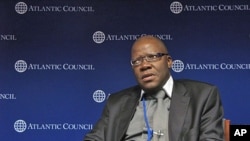Zimbabwe’s finance minister, Tendai Biti, says his country has a mixed record in terms of economic policies during a three-year power-sharing unity government. He also warns there has been no progress in terms of preparing better elections, which in the past have been marred by widespread violence and fraud.
At the Atlantic Council think tank Thursday, Biti, pleaded for outside help, both in terms of improving electoral conditions before it is too late, and in helping Zimbabwe’s economy.
Economic successes he outlined included dropping the Zimbabwean dollar as the official currency, which helped tame massive hyperinflation, and removing previous government restrictions such as price controls.
"The biggest thing which we did was to restore trust in the market, because we have been predictable, we have been consistent, and I have said if there is anyone who is going to push me to carry out a measure that I do not agree with, if anyone is going to force me to retain the Zimbabwean dollar, I will quit and go back to my law firm," Biti said.
A current power struggle concerns so-called indigenization policies, pushed forward by Zimbabwe’s black empowerment ministry.
Black Empowerment Minister Saviour Kasukuwere, from President Robert Mugabe’s ZANU-PF party, said earlier this month the government had taken majority ownership of all foreign-owned mining companies. But his claim was immediately disputed by Mugabe’s political rival, Prime Minister Morgan Tsvangirai.
The prime minister is the head of the Movement for Democratic Change, of which Biti is the secretary-general.
Biti said that while he understood the aim of indigenization and what he called "resource nationalism," in order to give citizens sustainable access to the wealth of their country, he called its implementation in Zimbabwe a "disaster."
"You are just transferring shares from a few rich, white people, to a few rich, black people so it is not democratization. It is just elite transfer. So it was not well thought out. And the true due process is not sufficiently being followed, so I think it is a program that we need to go back to the drawing board and then say genuinely how can we empower people," Biti said.
He listed other challenges including massive debt, very little foreign direct investment and much lower diamond-mining revenues than the government was expecting.
In terms of politics, Biti warned that if the current opportunity for successful elections is not met, any economic progress Zimbabwe has made could be erased.
Elections are expected by next year, but 88-year-old President Mugabe, in power for more than three decades and once again a candidate, has said he wants to hold them as soon as possible.
Biti had harsh words for President Mugabe.
"If you have a party that is placing its hopes in somebody who is 88 years old, I think there is something wrong with that. If you are 88 years, you belong to a people’s home, you belong to a wheelchair. To place the fate of a country to an 88-year-old, with great respect, I am not a member of ZANU-PF, but with great respect, it is an insult to present generations. We need renewal in Zimbabwe,” Biti said.
Mugabe has said he is still leading Zimbabwe to correct wrongs from the brutal colonial past of what was then white-minority rule Rhodesia.
News
Zimbabwe's Finance Minister Pleads For Outside Help




